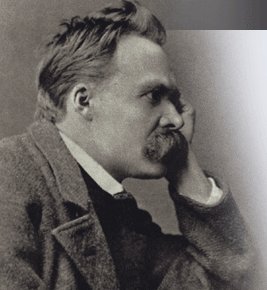|

|
| Friedrich Nietzsche |
THE PHILOSOPHY OF THE GOOD EUROPEAN
By Robert Edwards
We should adopt the nineteenth century German thinker, Friedrich Nietzsche,
as the father philosopher of our cause because not only did he embrace the idea of a European nation but also the vision of
a new type of man, similar to the “thought-deed” man of Oswald Mosley.
At the latter part of the nineteenth
century, Nietzsche wrote that the world is waiting for a man who will destroy the habits of thousands of years and, in their
place, create something better.
But Nietzsche was not always a European visionary and this “great man” of
his was, at one time, to be the Messianic Hope of Germany. In the preface to a book addressed to the composer, Richard Wagner,
he stated, “I would like nothing better than to meet a man with whom I could talk this way, a being of angry importance,
with the bravest eye and the keenest will; at once warrior, poet and philosopher; one whom you could imagine striding over
serpents and monsters.
“The hero of the future will be a man of tragic awareness. The light of Grecian joyousness
will be on his brow, the glory with which the rebirth of antiquity … hitherto lingering … will be inaugurated,
the rebirth in Germany of the Hellenic world”.
This early espousal of a deeply rooted political philosophy, purely
Germanic in character, persuaded many that Nietzsche was a harbinger of National Socialism in Germany and that the messiah
he referred to was Adolf Hitler. As prophesy, it was undeveloped, for Nietzsche went beyond even the twentieth century, as
this idea took on broader horizons.
After his break with Wagner, he rejected the narrower German nationalism and in his
last works he adopted a pan-Europeanism and the great man becomes the “good European”. This was not so much a
Hitler but more of an Oswald Mosley transcending the older, anachronistic ideas.
Because Europe was becoming one, economically
and culturally, he proposed it should be become one, politically … not a loose federal union but a pan-European force
in the world with the power to hold at bay the materialism of money-grubbing American capitalism. Now that is vision on a
superhuman scale.
This “heroic vitalism” is the philosophy of the aristocratic mind of Europe standing between
the Orient, which lacks vitality, and the United States of America which lacks heroism. Only the good European can achieve
the synthesis.
For Nietzsche, this Europe was not to be some pacifist bloc but a power capable of mastering the entire
world … just as the good European was to be a soldier first. For this purpose, Nietzsche proposed a union with Russia
and an accommodation with Britain. Remember, this was at a time when Britain pursued an imperialistic policy detached from
continental European interests and events. Russia was also in a pre-revolutionary phase. He wrote that Britain would crumble
and disintegrate within fifty years and the smaller nations of Europe would all be mastered. Prophetically, within fifty years,
Britain embarked on a course leading to the second European war of the twentieth century with the consequence that she lost
her entire Empire over the following decade.
There were to be two stages in the development of the good European. First,
there were to be the free spirits of today, that is, those Europeans that were born before the age of a united Europe. Then
will follow those who will inherit the continent after the “age of great wars and great politics”. Not the twentieth
century … but the twenty first.
Nietzsche’s philosophy of the new superior man would shock liberals today.
From Arthur Schopenhauer he adopted the dream of a kingdom of higher men, men who hated compromise but who loved adventure
and war. All previous ideas were symptoms of decadence and exhaustion over which the heirs of European culture would impose
their new order.
In his prophesy, the peoples of Europe, after the wars of the twentieth century, would serve a new race
of masters whom he called “the lords of the earth”, the people being the means to a greater end. And what is this
end … what is the purpose?
It is purely and simply the Will to Power, the energy of greatness moulding the man
of the future.
Nietzsche did not propose any system of rigid beliefs … for he had no need for the philosopher’s
“truth”. For the lords of the earth, their only belief was in their own power. The great man was to be indifferent
to public opinion. His strength emanates from a lack of conviction. He is too intelligent to be a bigot but uses the intellect
for his own greatness.
He is the bridge between good and evil … he is destiny.

|